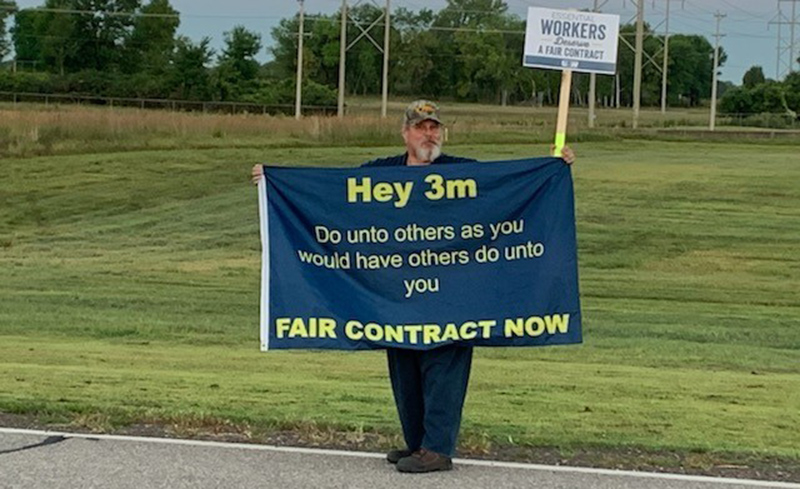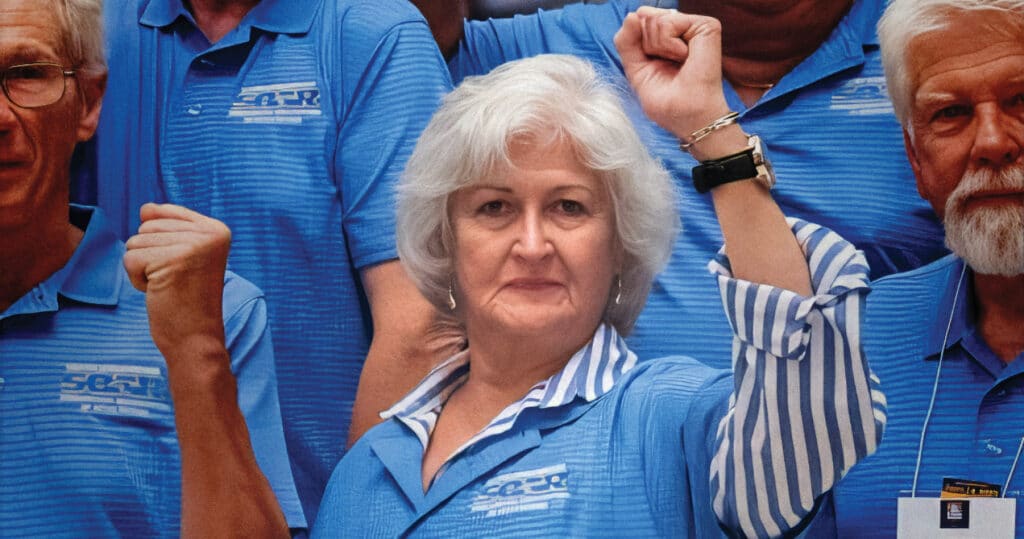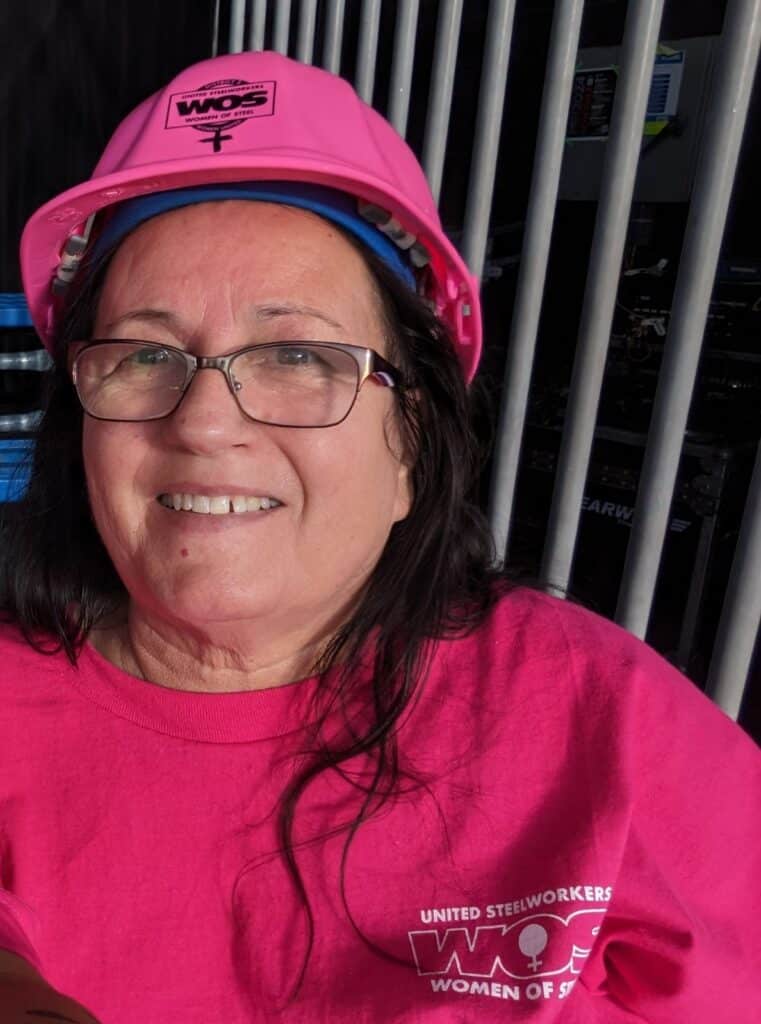3M Cottage Grove Members Push Back Against Company’s Unsafe Proposals
More than 350 members of Local 11-418 began mobilizing in August, preparing to fight for a fair agreement and pushing back on management’s contract demands that would undermine health and safety and disrupt work/life balance.
“It is good to see the solidarity of our membership fighting back against these unreasonable company proposals which would negatively affect the health and safety of our members and the communities they live and work in,” said John Shinn, head of the USW’s chemical sector.

Bargaining started June 8 for a new agreement covering some 292 production workers and 70 in the building crafts. They work at the 3M Cottage Grove campus in Minnesota at six plants, each organized as a division with its own departments.
Members make everything from chemicals for other products to abrasives used in sanding pads and grinding wheels. They make glass bubbles for insulation and weight reduction for items like cars and planes, matting for catalytic converters, specialty films and tape.
Local 11-418’s contract expired Aug. 18 and is extended until Oct. 16, 2020. If an agreement is not reached by then, the contract will continue on 72-hour rolling extensions.
Local 11-418 Vice President Justin Recla said management proposes that the departments within a division be combined into one department so managers can move employees into different jobs at will. “This would be extremely unsafe, and 3M has no training in place to even try to accomplish this,” he said.
“All they talk about is flexibility. They said if we would agree to the proposal, they would ‘try’ to have training in place within two to three years. The ‘Run now, Train Later’ initiative is not an acceptable method,” Recla said.
Health and safety at risk
While the local has safety concerns in other divisions, the chemical division is the most dangerous work environment on the 3M campus, Recla said. He explained why the company’s proposal for the chemical division would potentially harm workers’ health and safety and endanger the community and the environment.
There are numerous chemical reactors spread out into three departments in the chemical division. Each reactor is different, and on-the-job training can take up to two years on one reactor before the person is confident to work alone. Even then, Recla said, a person may only know 25-30 percent about the other reactors in that one department. Under the current practice, an employee only works on the reactor for which he or she has received training.
These reactors mix highly dangerous at high pressure to create violent reactions. Expecting untrained and inexperienced personnel—without an intense, formal training process—to learn how to operate different reactors when management consolidates the three chemical departments into one is “reckless at best,” Recla said.
District 11 Staff Rep. Brian Ecker said 3M made its proposal the first day of bargaining and it still has not gotten back on the local’s information request on combining departments. “This company proposal is a huge concern for the local,” he said.
Work/Home balance threatened
Recla said another big concern with the company’s proposal is that it gives management the ability to more freely move employees to other departments with no notice or approval by the union. Work schedules, including start times, would change for those moved, he said, because each department has different crew schedules and start times.
This will have a huge impact on workers’ work-life balance, Recla said, and “an employee’s quality of life outside of work is a top priority of the bargaining committee.”

Another company proposal gives management control over start times without the union’s approval. Management would give five days’ notice before changing start times, and it could implement 12-hour shifts.
“We feel this change would make it difficult to have a work/home life balance,” Recla said. “We have obligations outside of work, and for the company to change our start times and/or schedule with little notice would be unfavorable.”
Management control proposals
Ecker said that current contract language says the company and the union jointly determine job classifications when the company combines jobs or changes them. If there is disagreement, the union can take the issue to arbitration. He said the last time the union had to go to arbitration over a job classification was six years ago.
3M is proposing to delete this contract language and have “sole discretion to establish, discontinue, combine or modify job classifications.”
The company also proposes to change how job postings work, Ecker said. Under the company’s proposal, if a worker signs in to a new operation, they cannot leave to go to another unit for a year. If 3M adds a new piece of equipment, whoever is in the unit also cannot move to another job for a year.
The current agreement prevents 3M from changing benefits during the contract term, Ecker said, and the company wants to end that and have the ability to eliminate benefits unilaterally.
He said the company also wants to overhaul the grievance procedure. The company proposes “listening sessions” for the lower steps of the grievance procedure, with the human resources manager having sole authority to resolve grievances at the fourth and final step.
Mobilization
With help from USW’s Strategic Campaigns department, the local formed a Communications Action Team, which is texting bargaining updates and information about rallies to members, handing out flyers about informational pickets and using social media to drive home the local’s message. A billboard located near the 3M campus, Maplewood, also reinforces the local’s solidarity and need for a fair contract.
All these communication channels resulted in a good turnout for the local’s first informational picket. Ecker said about 150 members turned out at the gate. “It was really exciting and a really good turnout,” he said.

“When the company sees that many people outside their gate, it sends a message that the ‘concession stand is closed,’” Recla said. “They are definitely feeling the heat.”
Ecker said both sides will meet the end of September to bargain.
By clicking Sign Up you're confirming that you agree with our Terms and Conditions.
Recent News Articles
Want to Learn More?
See how the USW is making a real difference in our communities and our workplaces.

